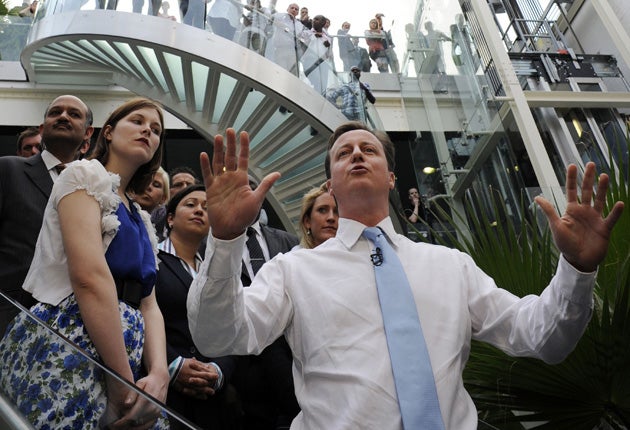No deal with Cameron after the election, say Lib Dem voters
Party's supporters favour an alliance with Labour in any hung parliament

Liberal Democrat voters would prefer to see Nick Clegg supporting Gordon Brown – rather than David Cameron – as prime minister in the event of a hung parliament after the election, according to a new survey.
The ComRes poll for The Independent and ITV News shows that 46 per cent of Liberal Democrat supporters would be happy if the election resulted in a hung parliament and Mr Brown remained in Downing Street; it found 31 per cent would be happy if Mr Cameron became prime minister in these circumstances.
The opinions of Liberal Democrat voters would be important if no party wins an overall majority on 6 May. Mr Clegg would need the backing of his party's MPs, leading activists and members to enter into a coalition with a minority government.
According to ComRes, the surge in support for the Liberal Democrats since Mr Clegg won last week's first televised leaders' debate may have peaked. The Conservatives are ahead on 32 per cent (up one point since The Independent on Sunday's poll at the weekend), Labour on 28 per cent (up one point), the Liberal Democrats also on 28 per cent (down one), and the other parties on 12 per cent (down one).
These figures would leave Labour, with 279 MPs, 47 seats short of an overall majority. The Tories would have 245 seats and the Liberal Democrats 94.
The volatility of the electorate is shown by a ComRes finding that more voters would favour a hung parliament with Mr Cameron as prime minister than one with Mr Brown remaining in No 10. Some 34 per cent would be happy with the Tory leader as prime minister in a hung parliament, and 31 per cent Mr Brown – even though the overall party ratings would leave Labour as the largest single party.
In a ray of hope for the Tories, voters would be most happy with a Conservative government (41 per cent), with 36 per cent saying they would be happy with a Labour government. But on all four possible election outcomes tested, the public would be more unhappy than happy, confirming that the election is still wide open.
Mr Clegg continued to dominate the campaign yesterday, forcing Mr Cameron to shelve a TV election broadcast attacking Mr Brown and record a new one in the back garden of his Notting Hill home addressing the unexpected threat posed by Mr Clegg, which has alarmed the Tories.
Mr Cameron warned that a hung parliament would result in "indecision" and could leave Britain "stuck" with Mr Brown. His aim was to seize back the "change" mantle from Mr Clegg, who will occupy the centre- stage spot in the second leaders' debate on Thursday. Mr Cameron admitted that the election has been "shaken up", but argued that his "big idea" – replacing Labour's "big government" with a "big society"– would mean "smashing apart the old politician-knows-best system".
Both the Tories and Labour turned their fire on Liberal Democrat policies. Mr Brown conceded that Mr Clegg was enjoying a "political honeymoon" but predicted it would be short-lived. The Prime Minister said: "I know a little about what it means to have a short political honeymoon. You go through these phases. I wish him well in his." He criticised the Liberal Democrat plans to cut tax credits and child trust funds, and the party's opposition to renewing the Trident nuclear weapons system.
Today Mr Brown will try to play to his strengths by unveiling a "growth manifesto". He will say: "The Conservatives believe that growth can happen by itself so long as government gets out of the way. But growth doesn't happen by chance. That is the economics of yesterday. Government is needed to pull away the barriers and obstacles that hold business back."
Mr Clegg said it was only to be expected that the two old parties would "lash out" as soon as voters showed they were ready to choose "something different". He said: "The general election campaign is starting to come to life for the simple reason that a growing number of people are starting – and it is only a start – to believe, starting to hope, that we can do something different this time."
The Liberal Democrat leader added that voters were seeing "that the old tired choices that they have been given by the old parties of the past no longer need to govern the way we run politics in the future".
ComRes found that the Tories are in third place among women (27 per cent), while men are much more positive about them (37 per cent). Labour is in third place in the North of England, Wales and the South-West, reflecting the surprise Liberal Democrat advance. Mr Clegg's party enjoys its strongest support (39 per cent) among 35-44 year-olds and is ahead among the C1 and C2 social groups. A crumb of comfort for the Tories is that people who decline to say how they would vote would be happiest with a Cameron-led government.
An ICM survey for The Guardian showed the Liberal Democrats (with 30 per cent) in second place behind the Tories (33 per cent), with Labour trailing third (28 per cent).
ComRes telephoned a random sample of 1,003 British adults on 17-18 April. Data were weighted to be representative of all British adults. ComRes is a member of the British Polling Council and abides by its rules. Full data at www.comres.co.uk
Join our commenting forum
Join thought-provoking conversations, follow other Independent readers and see their replies
Comments
Bookmark popover
Removed from bookmarks